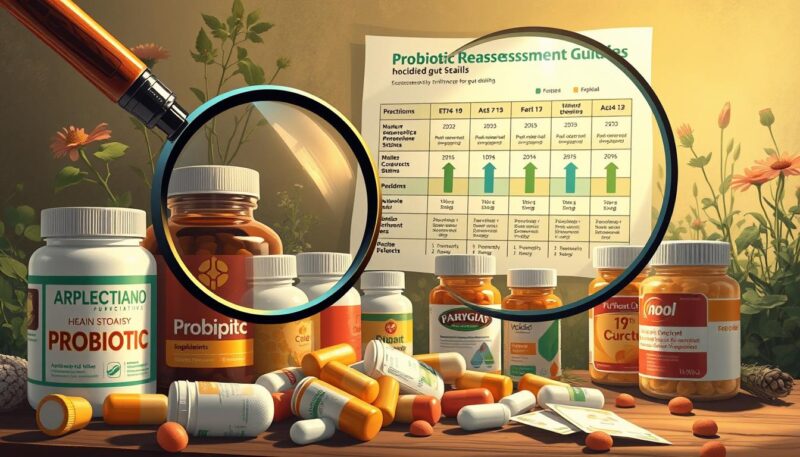In the U.S., one in three women of childbearing age have bacterial vaginosis. Probiotics might help lessen this condition’s severity. Many people hope probiotics will ease their digestive problems, but they’re not sure if they work.
Probiotics offer different benefits depending on your gut health and body type. Some people notice less bloating right away, while others may take months to see changes in bowel movements or immunity.
For probiotics to work, you need to use them regularly. The gut produces most of our serotonin, which affects our mood. Also, half of our immune cells are in the gut, showing how probiotics support our immune system. Knowing these signs helps you get the most out of your probiotics and avoid stopping too soon.
Key Takeaways
- Minor digestive symptoms may ease in 2 days, while chronic issues like IBS take 8-12 weeks.
- Most people see changes in bowel movements or bloating within 2-3 weeks of consistent use.
- Probiotics with 10-30 billion CFUs show better results for gut health improvement.
- Initial bloating or cramps may occur before long-term benefits like reduced colds or better sleep.
- Pairing probiotics with fiber-rich diets boosts their effectiveness in addressing constipation or gas.
Understanding How Probiotics Influence Your Body
Probiotics introduce live microorganisms to boost digestive health and overall wellness. They balance the gut microbiome by promoting good bacteria and fighting harmful microbes. These beneficial bacteria also help absorb nutrients and improve gut pH levels.
The Science Behind Probiotic Functionality
Strains like Lactobacillus and Bifidobacterium play a big role in gut health. They stick to intestinal walls, fighting off bad bacteria and strengthening the gut. For example, Lactobacillus acidophilus makes lactic acid, which stops pathogens from growing. They also make vitamins like B12 and K2, which support digestion.
How Long Before Probiotics Take Effect
When probiotics start working can vary. You might see small improvements like less bloating in 2–4 days. But, big changes in the gut microbiome can take 3–4 weeks. For long-term issues, it might take 8–12 weeks to see results.
How fast probiotics work depends on your gut health and the quality of the probiotics. For example, Lactobacillus rhamnosus GG (LGG) can cut down diarrhea by 21 hours when taken at 10^10 CFU daily.
Factors That Influence Probiotic Effectiveness
Several things affect how well probiotics work. Key factors include:
- Probiotic strains: Choose strains like Lactobacillus and Bifidobacterium that have been studied.
- CFU count
- Probiotic quality: Look for products that have been tested by third parties to ensure they have the right CFU count.
| Probiotic Strain | Primary Benefits |
|---|---|
| Lactobacillus acidophilus | Enhances lactose digestion, boosts immunity |
| Bifidobacterium bifidum | Supports colon health, reduces inflammation |
| Saccharomyces boulardii | Prevents antibiotic-associated diarrhea |
It’s important to follow the recommended dosage of probiotics, which is usually 10–30 billion CFU. Stress, a poor diet, or antibiotics can make probiotics less effective. Consistency and quality are key for lasting improvements in gut health.
Digestive Signs That Your Probiotics Are Working
Probiotics can change your digestive health in big ways. You might notice better regularity, less discomfort, and relief from symptoms. Let’s look at the signs to watch for.
Improved Bowel Regularity and Consistency

Seeing regular bowel movements and the right stool consistency means probiotics are working. Nature Made® Advanced Dual Action Digestive Probiotics use Lactobacillus plantarum and Bifidobacterium lactis to help with irregularity and constipation. These strains make stool softer and easier to pass, usually within 2–3 weeks.
Reduced Bloating and Gas
- Less bloating and gas often happen as probiotics take hold.
- Strains like Saccharomyces boulardii cut down on gas-causing fermentation.
- It’s normal to feel a bit gassy at first as your gut adjusts, but this usually goes away in 1–2 weeks.
Decreased Symptoms of Digestive Disorders
For IBS sufferers, probiotics like Lactobacillus rhamnosus GG can help. They also reduce gut inflammation, as seen in studies on IBD patients. It might take 4–8 weeks to feel better, but 70% of people see improvement in 6 weeks.
Enhanced Nutrient Absorption
| Benefit | Impact |
|---|---|
| Nutrient bioavailability | Improved B-vitamin and mineral uptake |
| Digestive enzyme activity | Enhanced breakdown of carbohydrates and fats |
| Gut barrier function | Reduced leaky gut symptoms and food sensitivities |
Probiotics, like Healthycell’s gel capsules, can make nutrients more available. They also help with gut barrier function, which is key for immune health. About 70% of our immune system lives in the gut lining.
“Probiotics take time—results often appear within 2–8 weeks depending on the user’s baseline gut health.”
Clear Signs Probiotics Are Working Beyond Digestion
Probiotics do more than just help with digestion. They often boost your immune system first. Since 70% of immune cells live in the gut, probiotics help keep it balanced. This makes you less likely to get sick and recover faster.
As your gut health gets better, you might feel happier. Over 90% of serotonin, which makes us feel good, is made in the gut. Probiotics can help make more of this hormone, reducing anxiety and stress.
Probiotics can also help you sleep better. They affect melatonin production, which helps you sleep deeper. This can lead to better mood and overall health.
- Probiotics can make your skin clearer or reduce eczema. This is because they reduce inflammation in the gut, which affects the skin.
- They can also improve vaginal health. Strains like Lactobacillus help balance the bacteria in the vagina, reducing bacterial vaginosis.
These benefits usually show up 6–8 weeks after starting probiotics. It’s important to keep taking them for long-term benefits. Watch for these signs along with any digestive changes to see how well they’re working.
When to Reassess Your Probiotic Regimen

If you’re still dealing with ineffective probiotics or lack of improvement after weeks, it’s time to rethink your plan. Signs like bloating or irregular bowel movements that get worse or don’t change after 2–4 weeks mean it’s time to make some changes.
“If there is no improvement after a given period or symptoms worsen, it’s time to stop and try a different option,” says Dr. Tarun Sharma, a gastroenterologist. Tracy Lockwood Beckerman, RDN, adds that mistakes in storage or dosage can lead to probiotic side effects like ongoing discomfort.
Signs Your Current Probiotics May Not Be Effective
- No lack of improvement after 2–4 weeks of consistent use.
- Worsening digestive issues like diarrhea or constipation.
- Probiotic side effects lasting longer than 2 weeks (e.g., chronic bloating).
- Ignoring probiotic strain selection errors like using multi-strain formulas for targeted needs.
When to Consider Changing Probiotic Strains
Choosing the right strain is key. Muti-strain probiotics offer a wide range of benefits, while targeted probiotics focus on specific issues like IBS or bloating.
| Health Goal | Recommended Strains |
|---|---|
| IBS Relief | Bifidobacterium infantis 35624 |
| Immunity Support | Lactobacillus rhamnosus GG |
| Gas/Bloating | Streptococcus thermophilus |
Research shows Synbiotic+ strains can boost butyrate production. But, success depends on matching strains to your body’s needs.
Consulting Healthcare Providers About Probiotic Effectiveness
If probiotic alternatives or changing strains doesn’t work, it’s time to get probiotic professional advice. A doctor consultation can help figure out if you need medical guidance for underlying health issues. Bring all the details like brands, duration, and symptoms to your visit for personalized probiotic recommendations. Remember, probiotics are supplements, not medicine, and might need a custom approach.
Conclusion: Monitoring Your Probiotic Journey for Optimal Gut Health
Gut health is all about being proactive and patient. Keep track of how well probiotics work by noticing things like regular bowel movements, less bloating, or more energy. Everyone’s body is different, so it might take weeks or even months to see changes.
Being consistent is key. Even small issues like mild bloating at first show that your gut is getting used to the probiotics.
Look for probiotics with strains like Bifidobacterium lactis. Studies show they can help with bloating. Make sure the label says it has at least 100 million CFUs per gram. Also, eating foods high in fiber, staying hydrated, and exercising can help your gut health.
Quality matters too. A study by Healthycell found that gel supplements are absorbed 165% better than tablets. This shows that not all probiotics are created equal.
Long-term benefits from probiotics come from using them regularly and living a healthy lifestyle. Notice if you feel happier or sleep better, as most of our serotonin comes from our gut. If you don’t see any changes after four weeks, it might be time to try a different strain or talk to a doctor.
Don’t stop using probiotics suddenly. It can upset the balance in your gut.
Good gut health is linked to a strong immune system, healthy weight, and clear thinking. By using probiotics, managing stress, and eating right, you can build a strong gut. Regular checks and tweaks will help your probiotic plan work best for you, leading to lasting health benefits.
FAQ
How do I know if my probiotics are working?
Look for signs like regular bowel movements and less bloating. Feeling more comfortable in your stomach is a good sign too. Also, if you notice better mood and nutrient absorption, it means your probiotics are working.
How long does it take for probiotics to show results?
Some people see small improvements in a few days. But, bigger changes might take weeks or months. Keep taking your probiotics regularly for the best results.
What factors influence how well probiotics work?
Many things affect how well probiotics work. This includes the type of probiotics, how many CFU (colony-forming units) you take, and how you store them. Your current gut health, diet, and stress levels also play a role.
What should I expect in terms of bowel function when taking probiotics?
You might find your bowel movements more regular and predictable. Expect better stool consistency and easier bowel movements.
Can probiotics help with digestive issues like IBS or IBD?
Yes, probiotics can help with digestive problems. They can calm your immune system, reduce inflammation, and improve your gut health. But, results can vary based on the probiotic strains you use.
How do probiotics contribute to nutrient absorption?
A healthy gut microbiome helps break down food better. It also boosts digestive enzyme production and improves gut barrier function. This leads to better nutrient absorption.
What are the signs that my probiotic is not effective?
If you still have digestive problems after 2-4 weeks, it might not be working. If your symptoms get worse, it’s also a sign it’s not right for you.
When should I consider switching to a different probiotic?
If you’re not seeing any improvement or if your symptoms get worse, it’s time to try something else. Look for different strains or formulas that might better fit your needs.
How can I optimize my probiotic usage?
Choose the right strains and the right CFU dosage. Store them properly. Adding prebiotics and fermented foods can also help your probiotics work better.
Should I consult a healthcare provider if probiotics aren’t working for me?
Yes, especially if you have health issues or persistent symptoms. A healthcare professional can give you advice tailored to your health.

